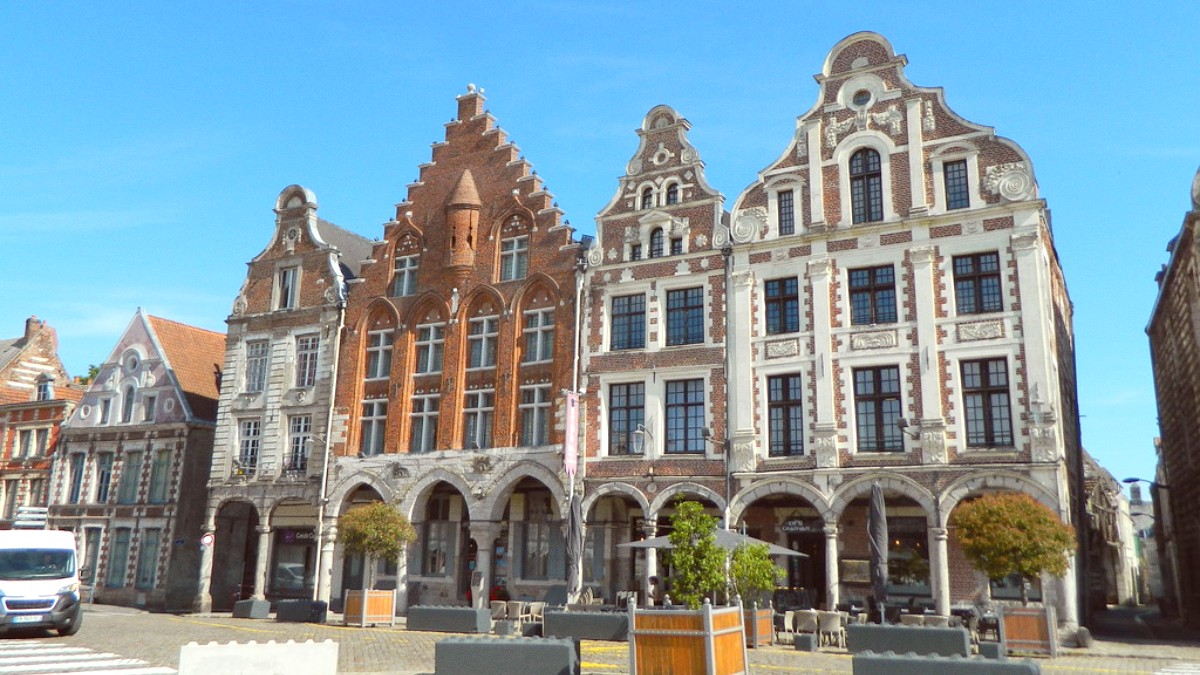
France
Spring (March-May): Temperatures gradually rise, ranging from 5°C to 15°C (41°F to 59°F). Days grow longer, and the city's parks and gardens begin to bloom. Moderate rainfall occurs, so a Waterproof jacket or umbrella remains of use. Humidity levels are generally comfortable.
Summer (June-August): This period brings the warmest weather. Average temperatures range from 15°C to 25°C (59°F to 77°F), occasionally higher. Long daylight hours are present, suitable for extended exploration. While generally pleasant, summer still sees some rainfall, often as short showers. Humidity is typically moderate, making for comfortable conditions for most activities.
Arras experiences no extreme weather phenomena like monsoons or hurricanes. While very hot summers or extremely cold winters are uncommon, they occur. The region occasionally has heatwaves in summer or periods of sustained cold in winter. Always consult the local weather forecast before and during your trip.
Visitors should always prepare for rain at any time of year. A Compact umbrella or a light waterproof jacket proves of use for unexpected showers.
(June-August)
Warmest weather, longest daylight. Arras Main Square Festival in July.
More crowds, peak accommodation and flight prices. Booking in advance advised.
(April-May, Sep-Oct)
Pleasant weather, fewer crowds. Lower prices. Spring blooms, autumn foliage.
Weather less predictable, higher chance of rain. Some reduced hours for smaller operations.
(November-March)
Fewest crowds, intimate exploration. Lowest prices for accommodation and flights. Festive atmosphere at Christmas market.
Cold weather, shorter daylight hours. Some outdoor activities less appealing or closed.
Spring (April-May) and early Autumn (September-October) present comfortable temperatures and fewer crowds, making them optimal for exploring the historic squares and streets on foot.
Visitors access WWI sites, like the Wellington Quarry, at any time of year. However, spring and autumn offer more pleasant conditions for walking around outdoor memorials and cemeteries.
Plan your visit for July to experience the major music festival and enjoy the city's summer outdoor events.
Visit in December to immerse yourself in the festive atmosphere of the Arras Christmas Market, a highlight of the winter season.
France is part of the Schengen Area, which simplifies travel within many European countries.
France belongs to the Schengen Area, a zone of 27 European countries that have abolished passport and other types of border control at their mutual borders. Non-EU/EEA/Swiss citizens may need a Schengen visa.
No general entry fees exist for tourists entering France. Upon arrival, immigration procedures involve presenting your passport to a border control officer. If relevant, present your visa or ETIAS authorization. Customs declarations are for certain goods.
Having proper documentation ready streamlines your entry process and stay.
Prices are estimates and vary based on season, how far in advance you book, and your personal choices. These daily costs include accommodation, meals, local transportation, and attraction entry.
The official currency of France, and thus Arras, is the Euro (€). Familiarize yourself with Euro denominations.
Currency exchange services operate at airports, major banks, and some exchange bureaus. Better exchange rates are often found by withdrawing cash from ATMs, which are widely available. Credit and debit cards (Visa and Mastercard) receive widespread acceptance. Inform your bank of travel plans to prevent card suspensions. Carry some cash for smaller purchases, local markets, or places preferring cash transactions.
Daily Costs: €50-€80. Accommodation from €25-€40 (hostel/guesthouse). Meals: €15-€25 (supermarkets, bakeries, casual eateries). Transport: €5-€10 (walk, public bus). Attractions: €5-€15 (free sites, one or two paid entries).
Walkable city center saves on transport.
Limited options for very cheap hostels.
Daily Costs: €100-€180. Accommodation: €60-€100 (3-star hotel/B&B). Meals: €40-€70 (restaurant lunches, cafes, "formule" menus). Transport: €10-€20 (public transport, occasional taxi). Attractions: €15-€30 (multiple paid sites, guided tours).
Balance of comfort and cost.
Dinner can still add up.
Daily Costs: €250+. Accommodation: €150+ (4-5 star hotel/boutique). Meals: €100+ (fine dining, gourmet experiences). Transport: €30+ (frequent taxi, private transfers, rental car). Attractions: €30+ (private tours, all desired attractions).
Premium services and maximum flexibility.
Cost adds up quickly for extended stays.
| Category | Item | Price Range (EUR) |
|---|---|---|
| Accommodation (per night) | Hostel dorm bed | €25-€40 |
| Mid-range hotel | €80-€150 | |
| Meals | Dinner at mid-range restaurant (main course) | €15-€30 |
Prioritizing your health and safety during travel proves a smart choice.
No specific vaccinations are mandatory for entry. Ensure routine vaccinations are current (MMR, Diphtheria-Tetanus-Pertussis, Polio, Chickenpox, seasonal Flu shot). Consult your doctor 4-6 weeks before your trip.
Travelers sometimes experience colds, flu, or mild stomach upsets. Practice good hand hygiene, use Hand sanitizer, and stay hydrated.
Use Sunscreen with SPF 50+, a hat, and Sunglasses. Mosquitoes occur in warmer months; use Insect repellent.
France boasts a high-quality healthcare system.
Emergency Number: Dial 112 for general emergencies (ambulance, police, fire brigade).
Hospitals: The Centre Hospitalier d'Arras (Boulevard Georges Besnier, 62022 Arras) functions as the main medical facility.
Pharmacies: Easily identified by a prominent green cross sign. Pharmacists offer advice for minor ailments and dispense non-prescription medications. Doctors: For non-emergencies, consult your travel insurance or visit a "médecin généraliste."
Tap water in Arras is safe to drink unless a sign explicitly indicates "eau non potable." Refill your Reusable water bottle from the tap.
France maintains high food hygiene standards. At markets, select produce that appears clean and well-stored.
Arras is considered a very safe city for tourists. Violent crime is rare. Petty crime, like pickpocketing, happens in crowded tourist areas.
Exercise standard urban caution in all areas, especially late at night or in less-trafficked industrial zones. Adhere to well-lit and populated areas during evening strolls.
A comprehensive travel insurance policy is strongly advised for all travelers. It safeguards against unforeseen circumstances.
Covers doctor visits, hospital stays, and emergency medical evacuation.
Protects your investment if your trip is unexpectedly canceled or cut short.
Delivers compensation for lost luggage or purchases if bags are delayed.